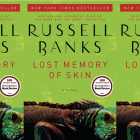“Free Ploughshares” Review: Spring 1984

Issue: Spring 1984
This is a review of a back issue of Ploughshares. The author won our “Free Ploughshares” contest that we hosted earlier this year and agreed to review his/her free issue. This post was written by Sarah Berry. Enjoy!
In his introduction to the Spring 1984 special poetry issue of Ploughshares, guest editor Seamus Heaney characterizes the poems compiled in the issue as strange. They are strange to him because, unlike the poetry featuring language with “a high specific gravity” to which he is usually drawn, these poems are “more relaxed, open-weave, temperate, purposeful.” He describes these unfamiliar poetic voices as typically American, melancholic but without the “great drive” of the confessional poets. So from the beginning of the issue, I was on the lookout for differences between the poetry in this issue and Heaney’s work, trying to tune my ear to the “strange” tone of this collection of poetry. But as I read, I was struck not by the differences between Heaney and the poets in this volume, but rather the similarities.
The melancholic tone that Heaney mentions in the introduction is certainly prominent throughout the volume. The opening lines in first poem in the volume, “Need” by William Aarnes, initiate prevailing motifs of loss and absence: “And for sure his soul is as good / as gone as the frayed ribbon quoting John and now marking a forgotten page in the Analects.” Poems like Marianne Boruch’s “The Blue Chair” and Vincent Buckley’s “An Easy Death” offer striking meditations on death.
Several poems in this issue remind me of specific themes in Heaney’s own poetry. Debra Nystrom’s “Punishment” shares not only a title with Heaney’s 1975 poem, but also exhibits a similar sense of guilt and complicity, simultaneously alienating and indicting the reader in much the same way that Heaney’s poem does. In Gibbons Ruark’s poem “Proof,” the narrator takes on his own version of the Sweeney persona also favored by Heaney. In Ruark’s poem, lines such as “Small hours of panic / Now dissolved in birdsong” offer countervailing hope amid the images of death and silence in the rest of the issue.
The piece that seems most synoptic with Heaney’s own work is the essay that concludes the issue: “The Poet in an Age of Distraction” by Sven Birkerts. This essay is rife with pithy, quotable aphorisms about the role of poetry and language, and it is accessible, making it something I would consider teaching as a supplement for Heaney’s “Crediting Poetry” or Shelley’s “Defence of Poetry.” Birkerts argues that poetry, as a result of its sustained attention to the inner life and silence, can serve as an antidote for our materialist, distracted culture. Like Heaney, Birkerts sees poetry as something miraculous, even as it focuses on death, darkness, silence, and absence. And the poems in this issue confirm Birkerts’ point. Elizabeth Spires’ poem “The Falling” is perhaps the best example. In this poem, which is probably my favorite of the issue, Spires tunes her ear to the small silences in between drops of falling rain, calling these silences “music we can’t understand.” Just as silence comes to be a sound in her poem, the poems throughout this issue of Ploughshares glean poetic life and light from darkness and death. In this regard, they are like Heaney’s poems. Even if their voices are different, they illustrate this process that is so common in Heaney’s poetry: deriving the miraculous from the mundane and the tragic.
Sarah Berry is a master’s student in English literature at Boston College. Her primary areas of interest include Modernism and contemporary Irish poetry. In addition to studying and teaching at Boston College, Sarah is the Assistant Managing Editor of Post Road Magazine.



